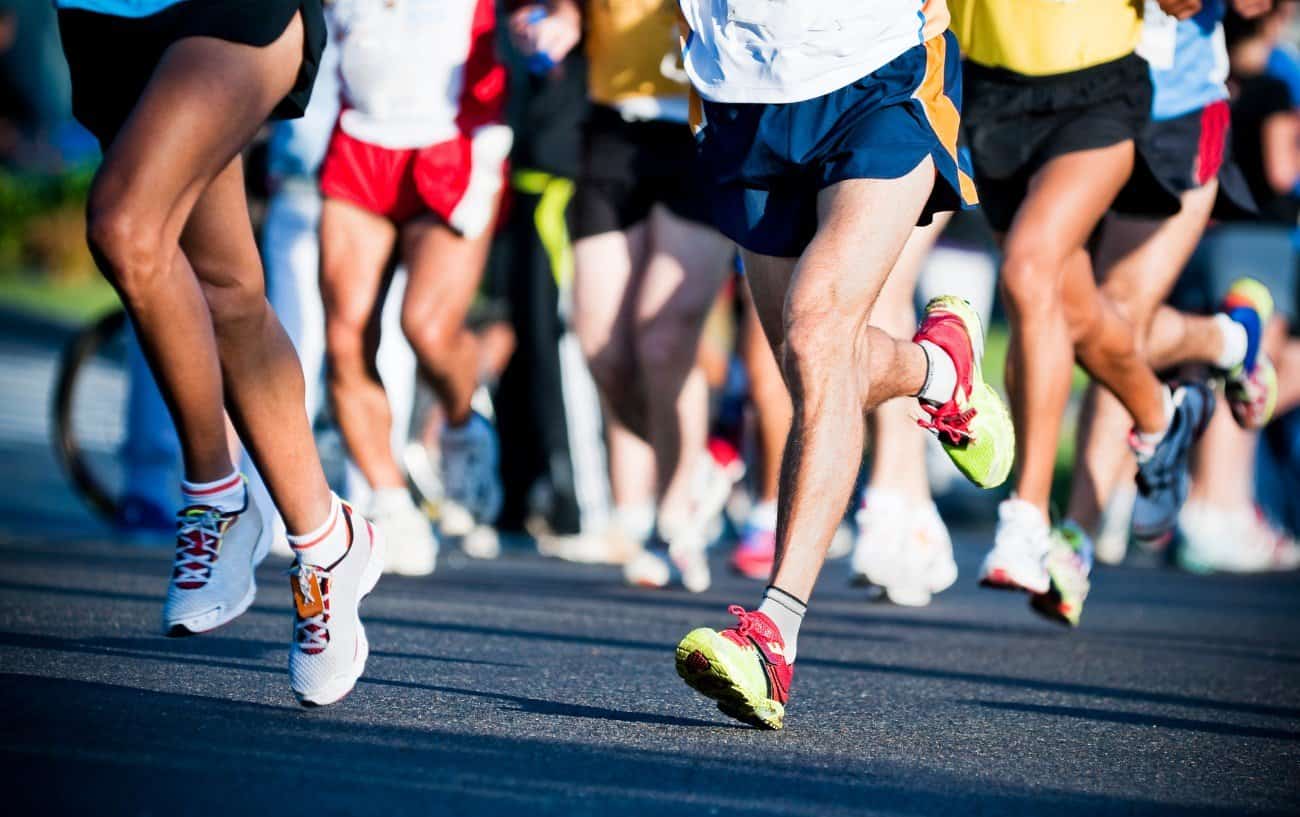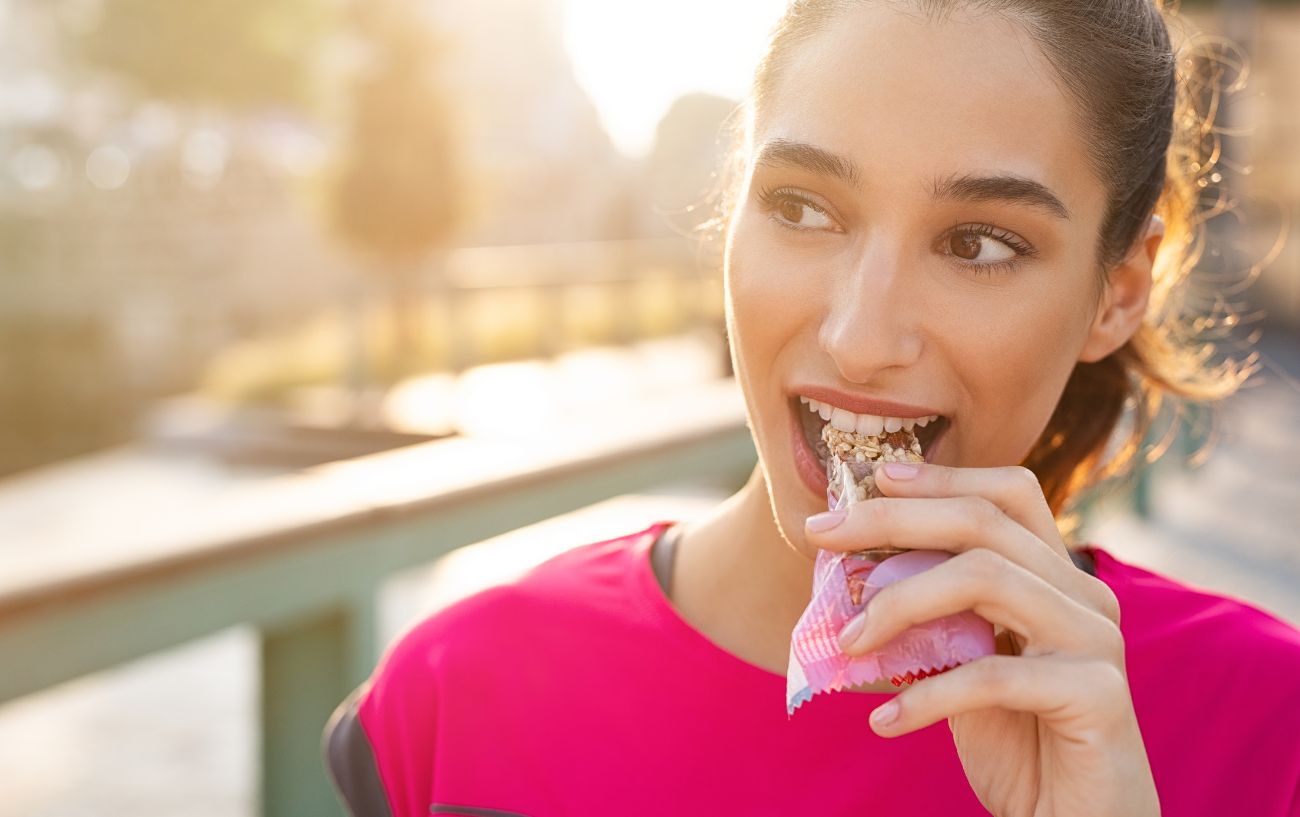As a running coach, I notice that my athletes often focus on what to eat the night before and the morning of a half marathon race but don’t focus as much on what to eat after a half marathon, which is equally important.
Although there are limited studies on half marathon running specifically, research1Protein Supplementation During or Following a Marathon Run Influences Post-Exercise Recovery. (2018). Nutrients, 10(3), 333. https://doi.org/10.3390/nu10030333 has found that what you eat immediately after a marathon can significantly impact the amount of muscle soreness and recovery you experience in the first 72 hours after the race.
In this guide, I will discuss what to eat after a half marathon to optimize your recovery and give your body the resources it needs post-race to get back to training.

What Is The Best Half Marathon Nutrition?
Before we discuss what to eat after a half marathon, it’s important to briefly discuss the general approach that can be helpful to take with nutrition for half marathon runners.
Like all people, many half marathon runners struggle with their diet in one way or another.
You might be inclined to overeat or emotionally eat, or you might adopt the common mindset of some long-distance runners, which is that you can eat whatever you want and however much you want because you are running so much.
Although some runners have an extraordinarily fast metabolic rate and can seemingly eat whatever they want without putting on weight (and it can actually be really difficult to maintain the weight they want), it’s still always best to try to make healthy, nutrient-dense choices about the foods that you are putting into your body.
Whether you are trying to lose weight by running, maintain your body weight, or even gain weight as a runner, try to aim to consume at least 80% of the calories in your diet from nutritious foods such as vegetables, fruits, whole grains, low-fat dairy products, eggs, lean proteins, legumes, nuts, seeds, and healthy fats.

The other 20% of the calories that you consume can be more of a discretionary or lax “free” choice allotment.
For example, if you enjoy a beer with dinner or you like fruit snacks or potato chips, you certainly do not need to eliminate them entirely, but they should form a relatively small percentage of your total caloric intake.
Focusing on healthy foods will help you feel your best while running and achieve the body composition you hope to achieve.
Processed food, refined grains, excessive sugar, alcohol, industrial oils in fried foods, and high-sodium foods can all be very inflammatory and may cause you to gain weight.
They are also not particularly filling, so you might find that you are suffering from “runger,” the feeling of an insatiable appetite after running.
How Do You Refuel After A Half Marathon?
Now that we’ve discussed the general overview of nutrition tips for half marathon runners, let’s look more specifically at the best foods to eat once you’ve crossed that finish line.
In general, the same principles apply: you want to try to eat at least 80% of your calories in your post-half marathon nutrition from nourishing, healthy foods.
The other 20% can be discretionary calories with celebratory foods that might not meet any particular nutritional needs. For example, you might enjoy a post-run beer, an ice cream sundae, or fries with your meal.
After all, you worked hard, and it’s important to celebrate and enjoy yourself on race day.
With that aside, let’s focus on the nutrition you should try to focus on when eating after running a half marathon to jump-start the recovery process.
After running a half marathon, you will want to focus on replenishing your muscle glycogen stores, restoring your fluid and electrolyte balance with proper hydration,2Maughan, R. J., Leiper, J. B., & Shirreffs, S. M. (1997). Factors influencing the restoration of fluid and electrolyte balance after exercise in the heat. British Journal of Sports Medicine, 31(3), 175–182. https://doi.org/10.1136/bjsm.31.3.175 and providing nutrients to repair muscle damage.
These goals are primarily achieved by eating complex carbohydrates, hydrating with fluids and foods naturally rich in electrolytes, and getting plenty of protein and anti-inflammatory foods to repair muscle damage and reduce inflammation.
Let’s take a look at each one in greater detail:

Why Are Carbs Important?
Complex carbohydrates will help replenish glycogen stores.
Although you have properly fueled properly before your half marathon by carb loading and during the race with your energy gels and race strategy, your glycogen stores should not be as depleted as they are after a full marathon.
However, it is still important to replenish glycogen.
The standard recommendation3Jentjens, R. L. P. G., van Loon, L. J. C., Mann, C. H., Wagenmakers, A. J. M., & Jeukendrup, A. E. (2001). Addition of protein and amino acids to carbohydrates does not enhance postexercise muscle glycogen synthesis. Journal of Applied Physiology, 91(2), 839–846. https://doi.org/10.1152/jappl.2001.91.2.839 for carbohydrate refueling after exercise is to consume 0.6–1.0 g/kg carbohydrate within 30 min and again every 2 hours for the next 4–6 hours.
For example, if you weigh 165 pounds (75 kg), you should aim to eat 45 to 75 grams of carbohydrates within 30 minutes after finishing a half marathon.
Because there are four calories for every gram of carbohydrates, this equates to 180-300 calories of carbohydrates.
As will be discussed shortly, it is also important to consume proteins. Protein helps repair muscles, and it has been shown to help facilitate glycogen resynthesis4Cintineo, H. P., Arent, M. A., Antonio, J., & Arent, S. M. (2018). Effects of Protein Supplementation on Performance and Recovery in Resistance and Endurance Training. Frontiers in Nutrition, 5(83). https://doi.org/10.3389/fnut.2018.00083 after exercise.
The standard recommendation is to consume a 3:1 or 4:1 ratio of carbohydrates to proteins after endurance exercise (post-marathon or half marathon) to have at least 20 grams of protein (20-25 grams is ideal).

Therefore, for our 165-pound runner, it would be optimal to consume about 20 grams of protein and 80 grams of carbohydrates in the immediate post-half-marathon meal or snack after running a half marathon.
High-carbohydrate foods that can replenish glycogen stores include whole grains such as oatmeal and quinoa, fresh and dried fruits, starchy vegetables such as sweet potatoes and white potatoes, corn, brown rice, granola, and legumes.
Dried fruit, smoothies, and energy bars are often great options for high-carbohydrate foods to eat right after running a half marathon when you might not yet have an appetite for a full meal.
How Do I Replenish Fluids and Electrolytes?
It is important to start rehydrating after you finish your half marathon. Even if you drink fluids such as sports drinks while you run, you will likely finish in a more dehydrated state than when you started.
Additionally, if you are having difficulty stomaching solid food, sipping sports beverages5Maughan, R. J., Leiper, J. B., & Shirreffs, S. M. (1997). Factors influencing the restoration of fluid and electrolyte balance after exercise in the heat. British Journal of Sports Medicine, 31(3), 175–182. https://doi.org/10.1136/bjsm.31.3.175 can help replenish some carbohydrates and electrolytes. Electrolytes can also be obtained through foods rich in natural electrolytes.
Examples include fruits such as watermelon, berries, cantaloupe, honeydew, oranges, clementines, peaches, coconut water, avocados, potatoes, eggs, and vegetables like leafy greens. Salted nuts can also provide sodium, protein, antioxidants, and anti-inflammatory fats.
Electrolytes lost when sweating are sodium, chloride, potassium, magnesium, and calcium.

How Much Protein Do I Need After A Half Marathon?
After finishing running a half marathon, we often reach for sweet foods and simple carbohydrates, which is certainly a good way to start replenishing glycogen, but it is also important to eat protein sources.
Your muscles need the amino acids and proteins to repair damage incurred during your half marathon race.
Studies6Protein Supplementation During or Following a Marathon Run Influences Post-Exercise Recovery. (2018). Nutrients, 10(3), 333. https://doi.org/10.3390/nu10030333 have found that the best post-running fueling strategy is to combine carbohydrates with protein because a balance of the two nutrients helps facilitate muscle repair and recovery and glycogen resynthesis.7Stearns, R. L., Emmanuel, H., Volek, J. S., & Casa, D. J. (2010). Effects of Ingesting Protein in Combination With Carbohydrate During Exercise on Endurance Performance: A Systematic Review With Meta-Analysis. Journal of Strength and Conditioning Research, 24(8), 2192–2202. https://doi.org/10.1519/jsc.0b013e3181ddfacf
It is best to spread out protein consumption in dosages of about 20 to 25 grams8Layman, D. K., Anthony, T. G., Rasmussen, B. B., Adams, S. H., Lynch, C. J., Brinkworth, G. D., & Davis, T. A. (2015). Defining meal requirements for protein to optimize metabolic roles of amino acids. The American Journal of Clinical Nutrition, 101(6), 1330S1338S. https://doi.org/10.3945/ajcn.114.084053 every four hours because the body has a limited ability to absorb a given amount of protein at one time.
For this reason, studies have demonstrated9Areta, J. L., Burke, L. M., Ross, M. L., Camera, D. M., West, D. W. D., Broad, E. M., Jeacocke, N. A., Moore, D. R., Stellingwerff, T., Phillips, S. M., Hawley, J. A., & Coffey, V. G. (2013). Timing and distribution of protein ingestion during prolonged recovery from resistance exercise alters myofibrillar protein synthesis. The Journal of Physiology, 591(9), 2319–2331. https://doi.org/10.1113/jphysiol.2012.244897 that the rule of thumb is to eat 20 to 25 grams of protein immediately post-workout and then every three hours for the next 12 hours.

After running a half marathon, you might not feel like eating common protein-rich foods like chicken, salmon, tuna, and ground beef, but many runners find that foods like protein bars, protein shakes, nuts, seeds, Greek yogurt, or even whole eggs are more palatable.
The source of the protein is less important than actually ensuring you take in enough protein.
Once your stomach has calmed down several hours after the race, you can focus on whole food sources of protein if you’re only up to eating a protein powder shake after the race. Some even swear by chocolate milk as a quick fix recovery drink!
Finally, it can be helpful to eat anti-inflammatory foods after running a half marathon to help attenuate the inflammatory process that your muscles will sustain after the rigors imposed upon them in your race.
Decreasing inflammation may potentially reduce muscle soreness10Rawson, E. S., Miles, M. P., & Larson-Meyer, D. E. (2018). Dietary Supplements for Health, Adaptation, and Recovery in Athletes. International Journal of Sport Nutrition and Exercise Metabolism, 28(2), 188–199. https://doi.org/10.1123/ijsnem.2017-0340 after your half marathon and facilitate faster muscle recovery.
Foods that are high in antioxidants11Zhu, F., Du, B., & Xu, B. (2017). Anti-inflammatory effects of phytochemicals from fruits, vegetables, and food legumes: A review. Critical Reviews in Food Science and Nutrition, 58(8), 1260–1270. https://doi.org/10.1080/10408398.2016.1251390 or omega-3 fatty acids tend to have an anti-inflammatory effect on the body.

Examples include fatty fish such as salmon and mackerel, flaxseeds, walnuts and other nuts, green leafy vegetables, dark berries, tart cherries, broccoli, green tea, legumes, and tomatoes.
Overall, knowing what to eat after a half marathon can help provide your body with the nutrients it needs to recover quickly from the race.
Focus on nutrient-dense foods, including complex carbohydrates and protein, but don’t be afraid to indulge in something special as well!
Now that you know exactly what you should fuel with after a half marathon to recuperate completely, what about during your big race? Do you even need to fuel during a 21k?
For a complete guide on what to eat during a half marathon, check out the following guide:












